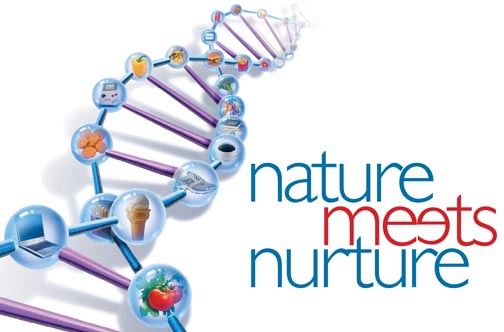Nature versus nurture is one of the oldest debates within the field of psychology. Nature refers to all the genes and hereditary factors that influence who we are, while nurture refers to all the environmental variables that impact who we are.
In the past, debates over the relative contributions of nature versus nurture often featured a one-sided approach—even in leadership discussions. Consider Thomas Carlyle’s “Great Man Theory” that suggests leadership traits are intrinsic, meaning that great leaders are born and will emerge when confronted with the appropriate situation. Whereas behavioral theories of leadership focus on leaders’ actions, people can learn to be great leaders through teaching and observation.
So, which is it—nature or nurture? As Becky often says, it’s not an either/or, it’s a both/and.
Genetics does play a role in leadership. In numerous twin studies evaluating the heritability of leadership, a majority demonstrate moderate genetic contributions with an overall relative influence of a genetic relationship for leadership up to 30%. Interestingly, a study conducted by JE DeNeve and colleagues demonstrates that leadership role occupancy may be associated with a single genetic marker that resides in a receptor gene on chromosome 8. The importance of that receptor gene? It’s related to personality traits, which suggests a link between leadership role occupancy and personality traits.
But 30% doesn’t make a leader; what about the other 70%? That’s where nurture takes its place. To date, no research has identified a single trait or mix of traits found in all leaders. Even efforts to identify characteristics that leaders share result in different lists of knowledge, skills, and abilities (KSAs). What does seem clear from these attempts is that great leaders commit to personal development in key areas, including inspiring and motivating others, displaying integrity, solving problems, driving for results, thinking strategically, and developing others.
What does all this mean? Simply, that great leaders refine their natural gifts and develop additional KSAs to meet the challenges of their role.
This week take some time to explore the gifts and KSAs that have helped you succeed. Below are some simple activities that will provide insight for reflection and a foundation to build from that will ensure you’re a better leader tomorrow than you are today.
Exploring Natural Gifts
- Take a strengths inventory. We often encourage clients to use https://www.viacharacter.org/. It’s a free tool.
- Take a personality inventory. We like the DiSC, True Colors, and the Enneagram.
- Complete this sentence: I’ve always been able to… (fill in the ability, asset, or quality that seems to have been with you since birth).
- Complete this sentence: It seems natural to me to… (fill in the activities you perform as a leader that are easy for you).
Exploring KSAs to Develop
- Review your last performance evaluation and look for development themes (e.g., relationship building, strategic thinking).
- Ask a trusted mentor/friend the top three areas you should develop to improve your leadership.
- Complete this sentence: I struggle with… (fill in the activities you perform as a leader that are most difficult for you).
- Complete this sentence: I often put off… (fill in the activities you know you should do as a leader, but you just don’t enjoy).
—–
Final Thought: Patrick Lencioni writes that leadership is “joyfully difficult.” When we capitalize on our natural talents and continually develop and deploy new KSAs, we may find ourselves experiencing more joy and less difficulty.


















